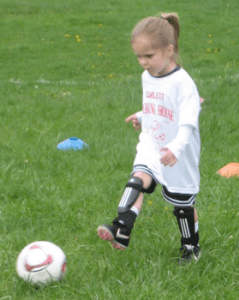I was flipping through one of my favorite books last week and came across a topic that I thought would be interesting for the Austin Mom Blog community.
The book is Outliers by Malcolm Gladwell. Gladwell, who is a #1 best seller and former writer at the Washington Post,uses the book to delve in to the mystery of what makes people successful. And, what he uncovers, tells a different story of what makes certain people, or groups of people, successful. The book is an easy read and provides some great theories and philosophies as to how outside factors have such a huge impact on success.
Not all babies are pre-planned. As has been written here before, our daughter Caroline was a huge surprise, and it happens all the time. One night of celebrating and then a week or two later you get a call from your wife or girl friend and she says, “Suprise, we are having a baby.” But, for plenty of other families, they make a conscious effort to plan out when they are going to get pregnant, and in turn, when their baby will be born.I wonder how much of that planning is based upon what Gladwell writes about in Outliers. He presents ideas that suggest that depending on the month of the year that a person is born in, it could give them inherent advantages over other people born at other times of the year. This is particularly true, he says, in activities where “it is determined who is good and who is not good at an ealry age; if you separate the ‘talented’ from the ‘untalented’; and if you provide the ‘talented with a superior experience.”
Generally, when you enroll your child in an activity they are grouped by age. Sometimes its a six month span, sometimes its a year span. Caroline, who is almost 19 months, is involved in soccer tots and the group she is in has kids ranging from 18 -35 months. Let’s say for a second that this was the beginning stages for the development towards making the local high school soccer team and Caroline is going to be grouped with these same kids from now until high school. If this were true, she would have almost no shot a making the high school team. At least based on the information presented in Outliers. What would happen is that the older kids in her group would mostly like be more mature, developed and have a better understanding of the game. Therefore, they would probably receive more attention from the coaches, individual training, and invitations to play with better teams, therefore developing their skills at faster rate. Fast forward to high school and we would probably find that most of the kids who made the team were probably closer to 35 months old on that first day of soccer tots than 18 months.Based on this example, its hard to say if Caroline would have been a great soccer player. She would have mostly likely weeded out and left behind. Not because she didn’t have the ability, but because she didn’t have the maturity at an young age to compete with kids even a few months older. As we know, there is a huge difference in maturity between a 35 month old and a 19 month old.And this is what Gladwell addresses in this portion of Outliers. In sports like soccer, hockey and baseball, kids are grouped together by age. The older kids, even if only by a few months, tend to be a bit more mature and developed, which leads small advantages like more practice time, which leads to making an all star team and playing against better competition and on and on. Meanwhile, the kid who is slightly younger doesn’t get the extra practice and coaching and ends up left behind.Gladwell even suggests that this is true in elementary school, where in kindergarten and first grade the older kids (again, even by just a few months) are usually the ones who end up in the advanced reading and math groups. Little by little they are the one’s who receive the extra teaching and the more advanced projects.
By the time the class reaches middle school or high school, these are the same kids who are the highest achievers. They were given more of an opportunity early on and they used it to become successful.There is a lot more to what Gladwell is talking about and the book is definitely worth the read.
So, the question I pose to you: If the month your child is born is has such a huge impact on their future success, would you make it a point to make sure they were born in the right month? And, would you guide your child towards activities where they might have a better chance of success based on what month they were born? Or, is all this way too much too worry about and your kid is going to be amazing and have great opportunities, regardless of which month they are born in?












Very interesting read!! I was born in November . . . Must be a “bad” month for sports. 🙂 Did Gladwell say there was a “best” month? With my genes, my kids are going to need all the help they can get to be sports stars!!
I just recently read & really enjoyed that book . . . and as the mother of a “late born” (June) 1.5 year old boy, I’ve already been asked whether I’ll hold him back when he gets to kindergarten – by moms quoting this book!
The answer for me is – it just depends on the child. I wouldn’t try to plan a birth month based on likely sports or school success – as someone who went through fertility, I’m just grateful to have a child born in any month. That being said, if it seems like my individual child would do better emotionally, mentally, and physically by being held back, then that I would consider.